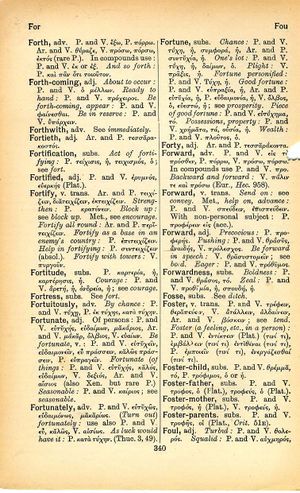fortunate
Ἕωθεν προλέγειν ἑαυτῷ: συντεύξομαι περιέργῳ, ἀχαρίστῳ, ὑβριστῇ, δολερῷ, βασκάνῳ, ἀκοινωνήτῳ: πάντα ταῦτα συμβέβηκεν ἐκείνοις παρὰ τὴν ἄγνοιαν τῶν ἀγαθῶν καὶ κακῶν. → When you wake up in the morning, tell yourself: The people I deal with today will be meddling, ungrateful, arrogant, dishonest, jealous, and surly. They are like this because they can't tell good from evil. | Say to yourself in the early morning: I shall meet today inquisitive, ungrateful, violent, treacherous, envious, uncharitable men. All these things have come upon them through ignorance of real good and ill.
English > Greek (Woodhouse)
adj.
Of persons: P. and V. εὐτυχής, εὐδαίμων, μακάριος, Ar. and V. μάκαρ, ὄλβιος, V. εὐαίων. Be fortunate, v.: P. and V. εὐτυχεῖν, εὐδαιμονεῖν, εὖ πράσσειν, καλῶς πράσσειν, P. εὐπραγεῖν. Fortunate (of things: P. and V. εὐτυχής, καλός, εὐδαίμων, V. δεξιός, Ar. and V. αἴσιος (also Xen. but rare P.). Seasonable: P. and V. καίριος; see seasonable.
Latin > English (Lewis & Short)
fortūnātē: adv., v. fortuno,
I P. a. fin.
Latin > French (Gaffiot 2016)
fortūnātē¹⁵ (fortunatus), adv., d’une manière heureuse : Cic. Fin. 3, 26 || -tius Plin. 3, 125.
Latin > German (Georges)
fortūnātē, Adv. (fortunatus), gesegnet, beglückt, glücklich, quam facile et quam fortunate evenit illi, obsecro, mulieri, quam liberare volt amator, Plaut. Epid. 243: bene et f. vivere, Plaut. mil. 706: semper feliciter, absolute, f. vivere, Cic. de fin. 3, 26: nihil satis scite aut f. gestum esse, Liv. 10, 18, 5.

